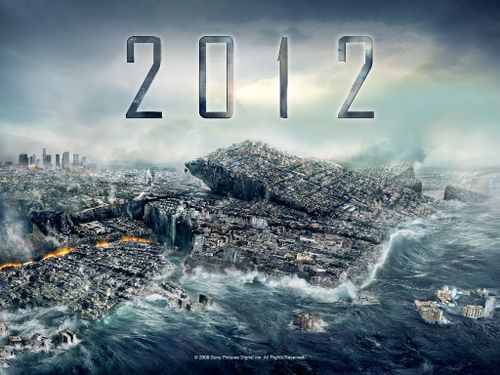 OK, I know this seems like a totally bizarre subject for a Classics/Ancient History blog, but I do have a point, I promise. Bear with me. Minor spoilers follow.
OK, I know this seems like a totally bizarre subject for a Classics/Ancient History blog, but I do have a point, I promise. Bear with me. Minor spoilers follow.I went to see this the other day and I have to admit, I actually really enjoyed it. I'm not suggesting it's a particularly good film necessarily, but I though it was genuinely fun and, unlike most viewers it seems, I wasn't bored by the 50-minute prelude before anything blows up. I actually liked the slow build-up of tension before the major stuff started happening, though I did think it was clear that John Cusack's character had never seen Dante's Peak during the Yellowstone section... Also, I learned from this film that it is possible to drive a limo through a building - glass, walls and all - and out the other side without damage to the limo or the people in it, even if one of the doors has already come off. Who knew?!
I did think the end was a bit too much - the movie seemed to be reaching a natural conclusion, then suddenly there was another 20 minutes of action and two more main character deaths, one a horribly contrived narrative convenience and the other - and I know this may sound crazy - I thought was a death too far. Yes, this is a movie that kills off half the human race. But that last death was narratively redundant, irritating and barely even noticed by the other characters (not to mention the physics of it were completely illogical).
There was one part that really irritated me though. The USian president and Italian prime minister nobly stay in their countries to 'go down with the ship' while other world leaders save themselves - fair enough, you might say. But one of the characters seen scuttling onto the ships to save themselves, as Mark Kermode put it, is the Queen (ours, that is. The Queen of the United Kingdom of Great Britain and Northern Ireland). During World War Two, our present Queen and her sister were sent to Windsor Castle for safety, but her parents stayed in Buckingham Palace throughout the Blitz, despite receiving several hits (OK, it's a big building, but still). Of all the people to depict as rushing to save themselves, to choose the Queen seems in poor taste. (They also killed off a character in the same Paris tunnel where Princess Diana died, which I actually recognised, and which was thoroughly cre
 epy. This was in even worse taste).
epy. This was in even worse taste).Anyway, the reason I'm covering it on the blog is a brief conversation between Chiwetal Ejiofor and Thandie Newton while on Air Force One. Thandie Newton's character, in addition to being the USian First Daughter, is a doctor of art history and has been working to save various masterpieces from destruction - Van Gogh, Da Vinci etc. Chiwetal Ejiofor's charater is a geologist who has brought his favourite, very unsuccessful, only-sold-400-copies science fiction novel with him. Thandie Newton muses on the process of deciding what to save - acknowledged 'masterpieces' which will now be the legacy of the human race - and Chiwetal Ejiofor points out that, along with all those, his personal favourite novel which no one else has read will also become part of their legacy, because he brought it and he is reading it.
My point (and I do have one) is that something similar happens with Classical texts. Many of them have been deliberately preserved because they are acknowledged masterpieces - Cicero, Virgil, Homer and so on. But some texts have been preserved, not because they were considered to be important works, but simply because people enjoyed reading them - the Greek novels spring to mind. Some texts are known only from fragments discovered in ancient Egyptian rubbish dumps. These can be just as revealing, if not more so, about the people who wrote and read them, but their survival is a matter of pure chance, like the barely-known novel saved in 2012 while millions of other, much more successful novels are lost. What they tell us about the ancient world is different from what we learn from the 'masterpieces' - acknowledged masterpieces show how people want to see themselves, but popular works show how they actually see themselves.
So there we go. Wisdom flowers in unexpected places. I'm moving house this weekend so forgive me if there's a bit of a break, and I promise I will at some point do another post on something more closely related to the Classical world!




No comments:
Post a Comment